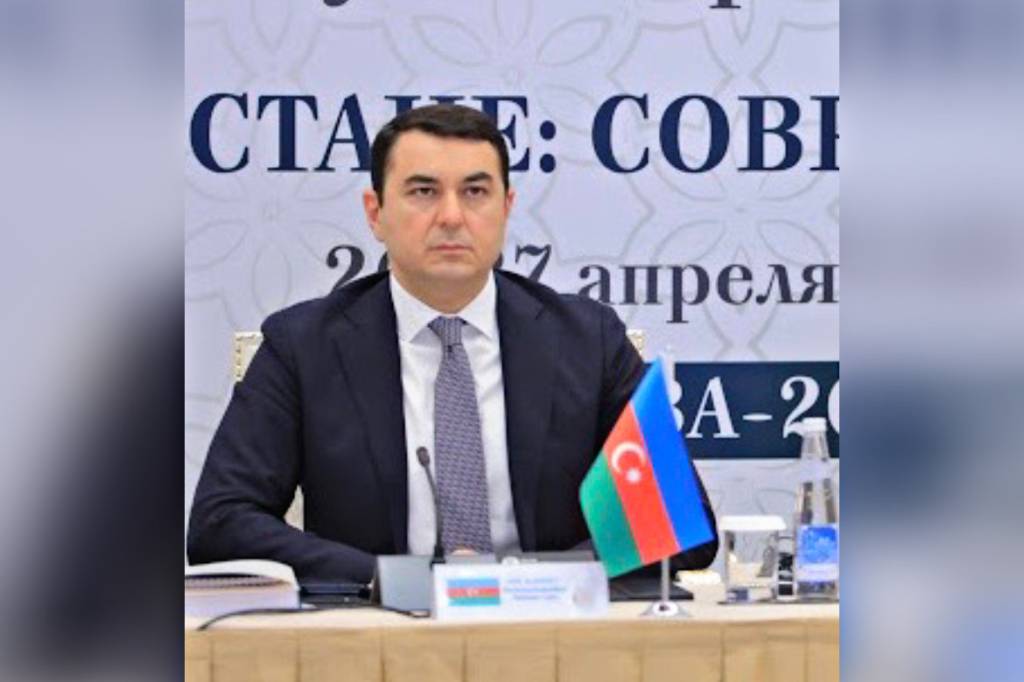
The Minister of Culture of the Republic of Azerbaijan, Adil Karimli, expressed deep gratitude for the high level of organization of the 2nd Turkic World Culture Forum and the International Bakhshi Art Festival, and sincere gratitude to the Ministry of Culture of friendly and fraternal Uzbekistan, as well as the leadership of Khorezm region for their attention and high level of hospitality.
He stressed that today, fraternal Uzbekistan, which is experiencing a renaissance in culture and many other areas, continues to transmit positive impulses within the country and throughout the Turkic world.
Holding the 2nd Turkic World Culture Forum on the same day as the International Bakhshi Art Festival gives them special significance and flavor. The revival of Bakhshi art, one of the most important cultural assets of the peoples of the Turkic world, is of exceptional importance for preserving the Turkic national identity and transmitting traditions and customs to a new generation. The role of partnership activities of leading international organizations such as TURKSOY, Turkic Culture and Heritage Foundation, the Turkic Academy, and the Parliamentary Assembly of Turkic States is essential, as they contribute to increasing the prestige of the forum.
The Minister paid special attention to the fact that the discussions and decisions taken within the framework of the forum will significantly contribute to further deepening cultural cooperation and strengthening the unity of the Turkic world.
Recalling the first Forum, which took place two years ago in Shusha, the cultural capital of the Turkic and Islamic world and the pearl of Azerbaijani culture, the Minister noted that the Forum, based on the concept of “Yesterday, Today and Tomorrow of Turkic culture”, has become a significant platform for discussing common problems and developing innovative solutions in such areas as shared cultural heritage, language, and creative industries. At the first Forum, with the support of the Turkic Academy, the project “Cultural Route of the Turkic World” was presented, the first meeting of cultural heritage leaders was held, and the initiative to create an Association of Turkic Animation was discussed. It is encouraging that these initiatives were highly appreciated at the level of heads of state at the 11th Summit of the Organization of Turkic States, held in Bishkek last November. In addition, the long-term and sustainable format of cultural cooperation, established in Shusha and continuing in Khiva, will open up new horizons for interaction. He also recalled that the cities of Shusha and Khiva have officially become twin cities since February 2023.
In recent years, bilateral and multilateral cooperation between the Turkic states has significantly increased in quality and scale in all areas. This became possible thanks to the far-sighted policy, the strong will of the heads of state, and a sincere atmosphere of trust and business partnership.
Stressing that Azerbaijan’s national cultural policy is based on the development of close cooperation with Turkic states, organizations, and peoples, the minister recalled the motto of the Head of state: “Our family is the Turkic world”. This expression has become a guide to action for all state institutions of Azerbaijan.
In addition, Adil Karimli recalled the speech of the President of Azerbaijan at the informal Summit of the Heads of State of the Organization of Turkic States, held in Shusha last July, where an important idea was voiced: “The 21st century should become the century of development of the Turkic world”, which today is the primary goal of all cultural initiatives.
The Minister of Culture of Azerbaijan noted with pride that Azerbaijan is successfully implementing multilateral projects in cooperation with fraternal Turkic countries. He called the contribution of friendly states to the restoration of the liberated territories of Azerbaijan one of the striking examples of brotherhood and solidarity: the construction of a secondary school named after Mirzo Ulugbek by Uzbekistan in Fuzuli, the creation of a Children’s Creativity Center named after Kurmangazy by Kazakhstan, and the construction of a school in Kyrgyzstan’s Aghdam district.
The Turkic civilization, one of the oldest in the world, has made an invaluable contribution to developing world culture and science. Great thinkers Nizami Ganjavi, Yunus Emre, Alisher Navoi, Imadeddin Nasimi, Muhammad Fuzuli, Abai Kunanbayev, and Chingiz Aitmatov played a considerable role in shaping the thinking of the Turkic peoples and developing their national consciousness. The cultural space of the Turkic world goes beyond modern states and requires broad integration. Projects to create an ethnocultural map of the Turkic world, a register of endangered customs, and samples of intangible cultural heritage will be invaluable to developing culture for future generations. The idea of cultural unity and mutual integration in the Turkic world is built on solid foundations and expresses a firm commitment to strengthening these ties.
Aziza Alimova, UzA








